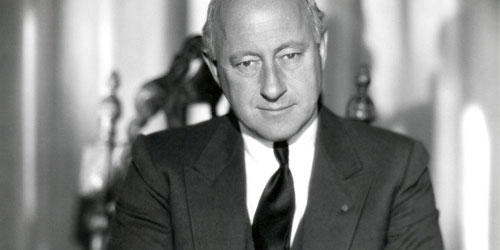
Cecil B. DeMille
Cecil Blount DeMille was a notorious North American director and producer, and one of the founders of the Academy of Motion Picture Arts and Sciences, being also considered one of the responsible for the establishment of Hollywood as one of the most important movie industries.
Born in August 1881 in Ashfield, in the state of Massachusetts, DeMille spent his childhood and teenage years in Washington, North Carolina. Cecil came from an upper middle class family, and his father, Henry DeMille, was a writer of theatre plays and a member of the American
Academy of Dramatic Arts; he was also a very religious man, and made regular readings in the Episcopal Church. This way, Cecil had a close contact with both the arts and religion fields from a very tender age, which would lately have a great influence in his filmography.
Cecil B. DeMille studied in the Military School in Pennsylvania, and later in the American Academy of Dramatic Arts, where he graduated in 1900. In the same year, DeMille made his first appearance has an actor in a play on Broadway, and in the following years he worked as a writer and director on multiple theatre plays, following the steps of his father. In 1913, Cecil B. DeMille started filming his first movie, “The Squaw Man”, and he chose California to be the set of the movie, which was a big hit, achieving success both financially and also among the critics. Hollywood was then established and the center of the North American film industry, being seen as the ideal location to film different types of movies. In the same year, together with Samuel Goldwyn e Jesse L. Lasky, DeMille founded the Lasky Feature Play Company, a film studio that would lately become known as Paramount Pictures.
Nevertheless, Cecil B. DeMille continued to develop his work as a movie director, and he continued to make multiple successful movies; by 1918, he had already directed 30 movies, and was considered one of the most prominent directors in Hollywood.
The genres that were more used by DeMille throughout his career were biblical and historical dramas, from which “The Ten Commandments”, from 1923 and “The King of Kings”, from 1926, stand out, being this last one a biography of Jesus Christ, and considered the biggest blockbuster in the silent film history.
Unlike what happened to many other directors, DeMille adapted pretty well to the introduction of sound in movies, as well as color, and has the movie industry evolved, he continued to direct several successful movies, such as “Cleopatra” (1934), “Samson and Delilah” (1949) or “The Greatest Show on Earth” (1952).
Throughout his prolific career, during which he directed 70 movies, Cecil B. DeMille was nominated for several awards, among which are the important nominations for the Oscars and Golden Globes; he won an Honorary Oscar in 1950, due to his contributes to the film industry, the Oscar for Best Picture with “The Greatest Show on Earth” in 1952, and the Oscar Irving G. Thalberg Memorial Award for the constant production of quality movies, in 1953.
Along with his career has a director and producer, DeMille also became very well-known due to his work as a radio host of “Lux Radio Theater”, a radio show about cinema.
Cecil B. DeMille died at 77 years, in 1959, and is to this day considered one of the most important North American film-makers, leaving an unparalleled legacy in terms of his contribution to the development of the cinematographic production in the United States of America.




